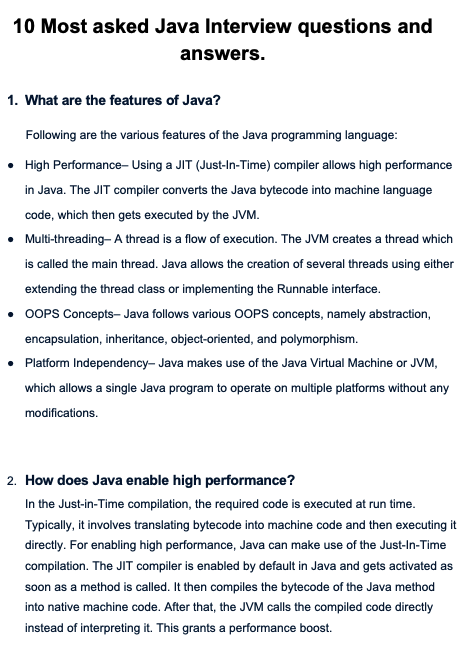High Performance and JIT Compilation in Java (Grade A)
Summary:
Java is a high-performance programming language that utilizes Just-In-Time (JIT) compilers to convert bytecode into machine code at runtime, significantly boosting performance. It is characterized by its object-oriented principles, such as abstraction, encapsulation, inheritance, and polymorphism, and provides platform independence through the Java Virtual Machine (JVM). Unique to Java are static methods and variables shared across all instances of a class, allowing access without needing a specific object instance. The language includes the terms ‘final’, ‘finalize’, and ‘finally’, where ‘final’ is a modifier indicating immutability, ‘finalize’ is a method invoked before garbage collection allowing an object to revive itself, and ‘finally’ is used in exception handling to ensure certain code executes regardless of any exceptions. Tasks such as reversing a string in Java can be accomplished with the ‘StringBuilder’ class and its ‘reverse’ method. Java supports inheritance, allowing a child class to acquire properties and functionalities of a parent class for code reusability. It also allows for creating abstract classes containing abstract (no body) and concrete (with body) methods, a feature not available to regular classes. Java version can be checked by executing ‘java -version’ on a command prompt or terminal. The language also includes automatic garbage collection, managed by the JVM to free up memory from unused objects. Lastly, Java’s original platform-dependent GUI toolkit is known as Abstract Window Toolkit (AWT), forming part of the Java Foundation Classes, which is used for creating windows, graphics, and user-interface widgets.
Excerpt:
High Performance and JIT Compilation in Java
10 Most asked Java Interview questions and answers.
- What are the features of Java?
Following are the various features of the Java programming language:
- High Performance– Using a JIT (Just-In-Time) compiler allows high performance in Java. The JIT compiler converts the Java bytecode into machine language code, which then gets executed by the JVM.
- Multi-threading– A thread is a flow of execution. The JVM creates a thread which is called the main thread. Java allows the creation of several threads by extending the thread class or implementing the Runnable interface.


Reviews